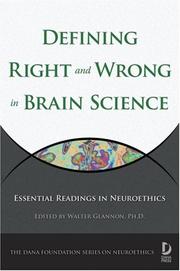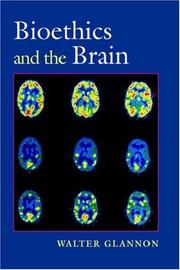| Listing 1 - 10 of 24 | << page >> |
Sort by
|

ISBN: 9781932594256 1932594256 Year: 2007 Publisher: New York, N.Y. Dana
Abstract | Keywords | Export | Availability | Bookmark
 Loading...
Loading...Choose an application
- Reference Manager
- EndNote
- RefWorks (Direct export to RefWorks)
Where is the line between instinct and free will in humans? How far can technology and medicine go to manipulate the brain? With every new discovery about the human mind, more and more questions emerge about the boundaries of consciousness, responsibility, and how far neuroscience research can go. The fledgling field of neuroethics has sought answers to these questions since the first formal neuroethics conference was held in 2002. This groundbreaking volume collects the expert and authoritative writings published since then that have laid the groundwork for this rapidly expanding debate. 'Defining Right and Wrong in Brain Science' traverses the breadth of neuroethics, exploring six broad areas& including free will, moral responsibility, and legal responsibility; psychopharmacology; and brain injury and brain death& in thirty provocative articles. The scientific and ethical consequences of neuroscience research and technology are plumbed by leading thinkers and scientists, from Antonio Damasio's & The Neural Basics of Social Behavior: Ethical Implications& to & Monitoring and Manipulating Brain Function& by Martha J. Farah and Paul Root Wolpe. These and other in-depth chapters articulate the thought-provoking questions that emerge with every new scientific discovery and propose solutions that mediate between the freedom of scientific endeavor and the boundaries of ethical responsibility. As science races toward a future that is marked by startling new possibilities for our bodies and minds, 'Defining Right and Wrong in Brain Science' is the definitive assessment of the ethical criteria guiding neuroscientists today.
General ethics --- Brain --- Neurosciences --- Neurology --- Research --- Moral and ethical aspects. --- ethics --- Ethics

ISBN: 0754604624 9780754604624 Year: 2002 Publisher: Aldershot, Hants, England: Burlington, VT: Ashgate,
Abstract | Keywords | Export | Availability | Bookmark
 Loading...
Loading...Choose an application
- Reference Manager
- EndNote
- RefWorks (Direct export to RefWorks)
This book is an analysis of the ways in which mental states ground attributions of responsibility to persons. Particular features of the book include: attention to the agent's epistemic capacity for beliefs about the foreseeable consequences of actions and omissions; attention to the essential role of emotions in prudential and moral reasoning; a conception of personal identity that can justify holding persons responsible at later times for actions performed at earlier times; an emphasis on neurobiology as the science that should inform our thinking about free will and responsibility; and the melding of literature on free will and responsibility in contemporary analytic philosophy with legal cases, abnormal psychology, neurology and psychiatry, which offers a richer texture to the general debate on the relevant issues.
verantwoordelijkheid (verantwoordingsplicht, verantwoording) --- responsabilité (imputabilité, obligation de rendre compte) --- Responsibility --- Cognition --- Accountability --- Moral responsibility --- Obligation --- Ethics --- Supererogation --- Psychology

ISBN: 0813365600 0813365767 Year: 2001 Publisher: Boulder (Colo.) Westview
Abstract | Keywords | Export | Availability | Bookmark
 Loading...
Loading...Choose an application
- Reference Manager
- EndNote
- RefWorks (Direct export to RefWorks)
Advances in genetic technology in general and medical genetics in particular will enable us to intervene in the process of human biological development which extends from zygotes and embryos to people. This will allow us to control to a great extent the identities and the length and quality of the lives of people who already exist, as well as those we bring into existence in the near and distant future. Genes and Future People explores two general philosophical questions, one metaphysical, the other moral: (1) How do genes, and different forms of genetic intervention (gene therapy, genetic enhancement, presymptomatic genetic testing of adults, genetic testing of preimplantation embryos), affect the identities of the people who already exist and those we bring into existence? and (2) How do these interventions benefit or harm the people we cause to exist in the near future and those who will exist in the distant future by satisfying or defeating their interest in having reasonably long and disease-free lives? Genes and Future People begins by explaining the connection between genes and disease, placing genetic within a framework of evolutionary biology. It then discusses such topics as how genes and genetic intervention influence personal identity, what genetic testing of individuals and the knowledge resulting from it entails about responsibility to others who may be at risk, as well as how gene therapy and genetic enhancement can affect the identities of people and benefit or harm them. Furthermore, it discusses various moral aspects of cloning human beings and body parts. Finally, it explores the metaphysical and moral implications of genetic manipulation of the mechanisms of aging to extend the human life span.The aim Genes and Future People is to move philosophers, bioethicists, and readers in general to reflect on the extent to which genes determine whether we are healthy or diseased, our identities as persons, the quality of our lives, and our moral obligations to future generations of people. The book is a sustained philosophical reflection on some of the metaphysical and moral issues presented by genetics and different forms of genetic intervention.
Human genetics --- Moral and ethical aspects. --- Philosophy. --- genetica (genen) --- genetische test (genetische zelftest) --- kloneren (klonen) --- gentherapie --- génétique (gènes) --- test génétique (autotest génétique) --- clonage --- thérapie génique --- Genetics --- Heredity, Human --- Human biology --- Physical anthropology --- Moral and ethical aspects --- Philosophy --- Moral and religious aspects

ISBN: 9780195307788 019530778X 0199867437 0195371941 9786610846634 0199719071 1280846631 1429420774 Year: 2007 Publisher: Oxford Oxford university press
Abstract | Keywords | Export | Availability | Bookmark
 Loading...
Loading...Choose an application
- Reference Manager
- EndNote
- RefWorks (Direct export to RefWorks)
Our ability to map and intervene in the structure of the human brain is proceeding at a very quick rate. Advances in psychiatry, neurology, and neurosurgery have given us fresh insights into the neurobiological basis of human thought and behavior. Technologies like MRI and PET scans can detect early signs of psychiatric disorders before they manifest symptoms. Electrical and magnetic stimulation of the brain can non-invasively relieve symptoms of obsessive-compulsive disorder, depression and other conditions resistant to treatment, while implanting neuro-electrodes can help patients with Parkinsons and other motor control-related diseases. New drugs can help regenerate neuronal connections otherwise disrupted by schizophrenia and similar diseases. All these procedures and drugs alter the neural correlates of our mind and raise fascinating and important ethical questions about their benefits and harms. They are, in a sense, among the most profound bioethical questions we face, since these techniques can touch on the deepest aspects of the human mind: free will; personal identity; the self; and the soul. This is the first single-author book on what has come to be known as neuroethics. Walter Glannon uses a philosophical framework that is fully informed by cutting edge neuroscience as well as contemporary legal cases such as Terri Schiavo, to offer readers an introduction to this fascinating topic. He starts by describing the state of the art in neuroscientific research and treatment, and gives the reader an up-to-date picture of the brain. Glannon then looks at the ethical implications of various kinds of treatments, such as: whether or not brain imaging will end up changing our views on free will and moral responsibility; whether patients should always be told that they are at future risk for neurological diseases; if erasing unconscious emotional memories implicated in depression can go too far; if forcing behavior-modifying drugs or surgery on violent offenders
neurowetenschappen --- neurologie --- neuroethiek --- vrije wil --- lichaam-geestprobleem --- medische technologie --- geneeskundige behandeling --- neurosciences --- neurology --- neuroéthique --- libre-arbitre --- problème corps-esprit --- technologie médicale --- traitement médical --- Bioethics. --- Brain --- Medical ethics. --- Neurosciences --- Research --- Moral and ethical aspects. --- Bioethics --- Medical ethics --- Neural sciences --- Neurological sciences --- Neuroscience --- Medical sciences --- Nervous system --- Biomedical ethics --- Clinical ethics --- Ethics, Medical --- Health care ethics --- Medical care --- Medicine --- Professional ethics --- Nursing ethics --- Social medicine --- Cerebrum --- Mind --- Central nervous system --- Head --- Biology --- Life sciences --- Life sciences ethics --- Science --- Research&delete& --- Moral and ethical aspects
Book
ISBN: 9781316318768 1316318761 9781139565820 1139565826 9781107036031 1316322122 131630874X 1316328805 1316325466 1316332144 1107036038 1108449301 131628798X Year: 2015 Publisher: Cambridge : Cambridge University Press,
Abstract | Keywords | Export | Availability | Bookmark
 Loading...
Loading...Choose an application
- Reference Manager
- EndNote
- RefWorks (Direct export to RefWorks)
Neuroscientific evidence has educated us in the ways in which the brain mediates our thought and behavior and, therefore, forced us to critically examine how we conceive of free will. This volume, featuring contributions from an international and interdisciplinary group of distinguished researchers and scholars, explores how our increasing knowledge of the brain can elucidate the concept of the will and whether or to what extent it is free. It also examines how brain science can inform our normative judgments of moral and criminal responsibility for our actions. Some chapters point out the different respects in which mental disorders can compromise the will and others show how different forms of neuromodulation can reveal the neural underpinning of the mental capacities associated with the will and can restore or enhance them when they are impaired.
Brain --- Free will and determinism. --- Research. --- Brain research --- Compatibilism --- Determinism and free will --- Determinism and indeterminism --- Free agency --- Freedom and determinism --- Freedom of the will --- Indeterminism --- Liberty of the will --- Determinism (Philosophy)
Book
ISBN: 9781107583412 9781316443712 9781107131972 Year: 2019 Publisher: Cambridge : Cambridge University Press,
Abstract | Keywords | Export | Availability | Bookmark
 Loading...
Loading...Choose an application
- Reference Manager
- EndNote
- RefWorks (Direct export to RefWorks)
Neurosciences --- Memory --- Mémoire --- Moral and ethical aspects. --- Aspect moral. --- Mémoire
Book
ISBN: 131644371X 1108638317 1108637485 1107131979 1107583411 Year: 2019 Publisher: Cambridge, England : Cambridge University Press,
Abstract | Keywords | Export | Availability | Bookmark
 Loading...
Loading...Choose an application
- Reference Manager
- EndNote
- RefWorks (Direct export to RefWorks)
The Neuroethics of Memory is a thematically integrated analysis and discussion of neuroethical questions about memory capacity and content, as well as interventions to alter it. These include: how does memory function enable agency, and how does memory dysfunction disable it? To what extent is identity based on our capacity to accurately recall the past? Could a person who becomes aware during surgery be harmed if they have no memory of the experience? How do we weigh the benefits and risks of brain implants designed to enhance, weaken or erase memory? Can a person be responsible for an action if they do not recall it? Would a victim of an assault have an obligation to retain a memory of this act, or the right to erase it? This book uses a framework informed by neuroscience, psychology, and philosophy combined with actual and hypothetical cases to examine these and related questions.
Neurosciences --- Memory --- Medical ethics. --- Biomedical ethics --- Clinical ethics --- Ethics, Medical --- Health care ethics --- Medical care --- Medicine --- Bioethics --- Professional ethics --- Nursing ethics --- Social medicine --- Retention (Psychology) --- Intellect --- Psychology --- Thought and thinking --- Comprehension --- Executive functions (Neuropsychology) --- Mnemonics --- Perseveration (Psychology) --- Reproduction (Psychology) --- Neural sciences --- Neurological sciences --- Neuroscience --- Medical sciences --- Nervous system --- Moral and ethical aspects. --- Moral and ethical aspects
Book
ISBN: 1009086669 1009078046 1009085247 1009085441 Year: 2022 Publisher: Cambridge : Cambridge University Press,
Abstract | Keywords | Export | Availability | Bookmark
 Loading...
Loading...Choose an application
- Reference Manager
- EndNote
- RefWorks (Direct export to RefWorks)
This Element examines the main ethical aspects of consciousness It argues that consciousness is not intrinsically valuable but has value or disvalue for individuals depending on its phenomenology (what it is like to be aware) and content (what one is aware of). These two components of awareness shape normative judgments about how ordered, disordered, altered, restored, diminished and suppressed conscious states can benefit or harm individuals. They also influence moral judgments about whether intentionally causing these states is permissible or impermissible and how these states can affect behavior. After describing its neurobiological basis, this Element discusses ethical and legal issues in six categories of consciousness: phenomenal and access consciousness; intraoperative awareness; prolonged disorders of consciousness, dissociative disorders, the role of consciousness in determining death; and altering and suppressing awareness near the end of life.
Book
ISBN: 1009304615 1009304593 1009304585 1009304623 9781009304580 9781009304627 9781009304610 Year: 2023 Publisher: Cambridge, England : Cambridge University Press,
Abstract | Keywords | Export | Availability | Bookmark
 Loading...
Loading...Choose an application
- Reference Manager
- EndNote
- RefWorks (Direct export to RefWorks)
The immune system maintains homeostasis within human organisms and protects them from pathogenic threats. But sometimes it cannot provide this protection on its own, and vaccines may be necessary to ensure our health and survival. Immune functions can become dysregulated and result in autoimmune disease or multi-system damage. Pharmacological and genomic interventions may activate or modulate immune functions to prevent these outcomes. This volume is an analysis and discussion of some of the ethical implications of these interventions.
Immune response --- Biological response modifiers --- Regulation --- Moral and ethical aspects. --- Biological response modifiers. --- Regulation.

ISBN: 9780195144314 0195144317 Year: 2005 Publisher: Oxford: Oxford university press,
Abstract | Keywords | Export | Availability | Bookmark
 Loading...
Loading...Choose an application
- Reference Manager
- EndNote
- RefWorks (Direct export to RefWorks)
| Listing 1 - 10 of 24 | << page >> |
Sort by
|

 Search
Search Feedback
Feedback About UniCat
About UniCat  Help
Help News
News